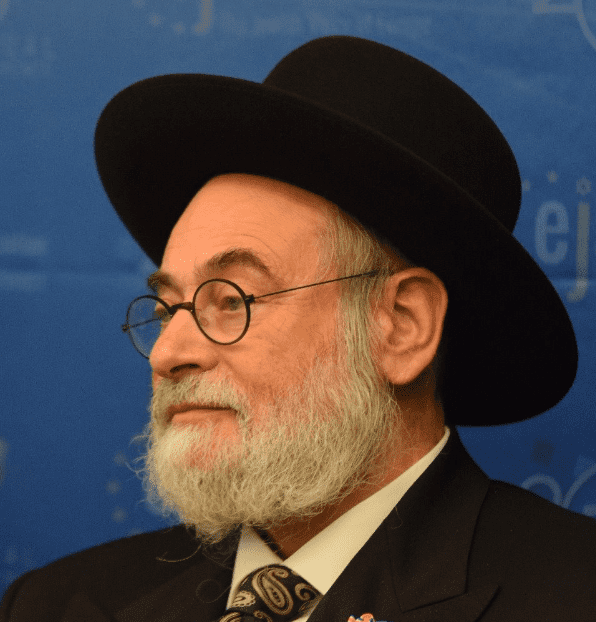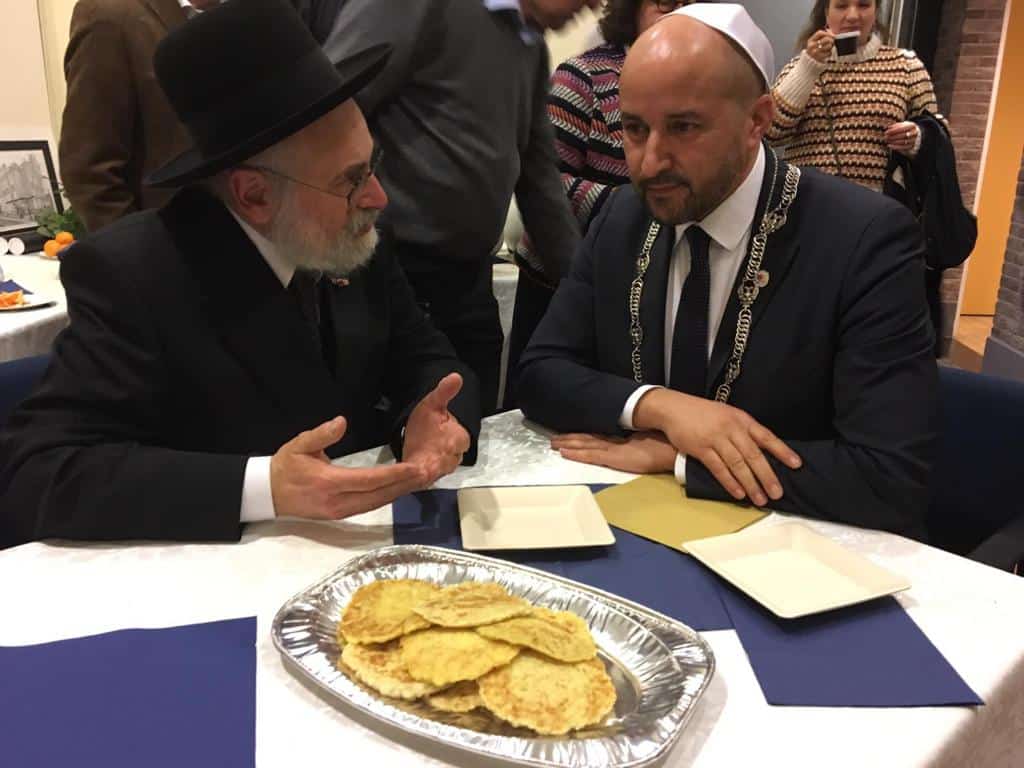Every Day during the Corona crisis our Advisory Board Member Chief Rabbi Binyomin Jacobs (NL) writes a diary, on request of the Jewish Cultural Quarter in Amsterdam, which is published on the website of the NIW, the only Jewish Dutch Magazine. Rabbi Jacobs is the head of Inter Governmental Relationships at the Rabbinical Centre of Europe. We will be regularly publishing a selection of his informative, sometimes light hearted, but always wise pieces.
For our Dutch readers you can follow the diary every day at NIW home page: https://niw.nl
Inspired by a wise old lady who very carefully asked my opinion about insulting people, for example in a cartoon, I came to the conclusion that freedom also needs boundaries.
The first question is, of course, what is insulting? I read recently in a paper that “It is to be feared that airline (ELAL) policy will only become more orthodox”. What’s the meaning of this? And what is Orthodox?
To obey the law or not, if that is what is meant by orthodox, is not the same as good or bad. I remember Gerhard and Beppie Caneel, survivors of the war. Good, sweet, gentle people through and through. Both came from the war seriously damaged and yet always cheerful.
They came to the shul every Shabbat, but otherwise they did not really live according to Jewish law. My Judaism is my heart, Gerhard often said. And that was a visible truth. But they were considered Orthodox by members of the congregation who only appeared in the synagogue on the High Holidays, that is, three times a year.
And people who only entered the synagogue on the Day of Atonement thought those High Holiday Jews were orthodox and me probably very orthodox.
In other words: who sets which boundary where? And the most important question: should there be boundaries? Why all those boxes? I am Jewish and just as Jewish as Beppie and Gerhard. And whether I am good? That is determined Above! But I know 100% that Beppie and Gerhard were good people through and through. And so I find “the fear that the ELAL will become more orthodox” a polarising statement. And polarisation is dangerous, whether in word or image.
And so I asked some survivors what they think about that wise old lady’s concern about consciously insulting believers. All survivors I approached shared her view that there should be limits to free speech. Everyone may think that his way of thinking is the only correct one, but there must be room for others to have a different opinion. If I condemn a different religion or way of life in razor-sharp words, it should be possible. But if my conviction calls for killing or discriminating against the other, then I must be called to order and put under lock and key because of sedition.
But what if I just insult? If that is allowed, why are we, as a Jewish community, so excited about the floats in Aalst? Anything and everything is possible, right?
Some years ago I was confronted with an educational audiovisual program from the churches. The images were formed with sand. There were images and a narrator. The subject was the origin of Christianity. Supporters and opponents of the new religion were all Jews.
But in the broadcast, the opponents had long noses, all looked very angry and gave the impression that they were bad people. How will those images affect the youthful viewers of that program? We went to the makers of the program with a minister friend, with the result that they adjusted the entire program. Their intention was absolutely not to incite hatred! I am a staunch fanatical super ultra-orthodox advocate of freedom of religion, freedom of speech and freedom of the press. But what if violence ensues as a result of being insulted?
What then? That old wise lady is of the opinion that insulting is also wrong. I share her opinion.
I find it unacceptable to destroy fellow human beings spiritually, deeply hurting them. And so I can protest against the float in Aalst because I experience it as insulting.
The Jew with a long nose, tons of money and dollar signs. I can also go to court. But violence against a float that proclaims a message that I find dangerous, taking the law into your own hands or calling for the right to take into your own hands: no way!
And so I think that old wise lady, herself a survivor of the Shoah, is right. Anything and everything is allowed, but not unlimited. And that is why I was so delighted that I was allowed to lay a wreath in front of the Jewish monument with Mayor Marcouch in Arnhem last Sunday, despite corona.
An Islamic mayor and a Jewish rabbi stood hand in hand (because of corona only in spirit) to demonstrate that what could happen then must never happen again. And a few hours later, during the virtual commemoration of Kristallnacht, the Protestant Churches declared loud and clear in a statement that together, from a deep sense of belonging, we will fight against anti-Semitism and for friendship.
Freedom of expression, of the press, of belief: Certainly. But…with limits!
The first question is, of course, what is insulting? I read recently in a paper that “It is to be feared that airline (ELAL) policy will only become more orthodox”. What’s the meaning of this? And what is Orthodox?
To obey the law or not, if that is what is meant by orthodox, is not the same as good or bad. I remember Gerhard and Beppie Caneel, survivors of the war. Good, sweet, gentle people through and through. Both came from the war seriously damaged and yet always cheerful.
They came to the shul every Shabbat, but otherwise they did not really live according to Jewish law. My Judaism is my heart, Gerhard often said. And that was a visible truth. But they were considered Orthodox by members of the congregation who only appeared in the synagogue on the High Holidays, that is, three times a year.
And people who only entered the synagogue on the Day of Atonement thought those High Holiday Jews were orthodox and me probably very orthodox.
In other words: who sets which boundary where? And the most important question: should there be boundaries? Why all those boxes? I am Jewish and just as Jewish as Beppie and Gerhard. And whether I am good? That is determined Above! But I know 100% that Beppie and Gerhard were good people through and through. And so I find “the fear that the ELAL will become more orthodox” a polarising statement. And polarisation is dangerous, whether in word or image.
And so I asked some survivors what they think about that wise old lady’s concern about consciously insulting believers. All survivors I approached shared her view that there should be limits to free speech. Everyone may think that his way of thinking is the only correct one, but there must be room for others to have a different opinion. If I condemn a different religion or way of life in razor-sharp words, it should be possible. But if my conviction calls for killing or discriminating against the other, then I must be called to order and put under lock and key because of sedition.
But what if I just insult? If that is allowed, why are we, as a Jewish community, so excited about the floats in Aalst? Anything and everything is possible, right?
Some years ago I was confronted with an educational audiovisual program from the churches. The images were formed with sand. There were images and a narrator. The subject was the origin of Christianity. Supporters and opponents of the new religion were all Jews.
But in the broadcast, the opponents had long noses, all looked very angry and gave the impression that they were bad people. How will those images affect the youthful viewers of that program? We went to the makers of the program with a minister friend, with the result that they adjusted the entire program. Their intention was absolutely not to incite hatred! I am a staunch fanatical super ultra-orthodox advocate of freedom of religion, freedom of speech and freedom of the press. But what if violence ensues as a result of being insulted?
What then? That old wise lady is of the opinion that insulting is also wrong. I share her opinion.
I find it unacceptable to destroy fellow human beings spiritually, deeply hurting them. And so I can protest against the float in Aalst because I experience it as insulting.
The Jew with a long nose, tons of money and dollar signs. I can also go to court. But violence against a float that proclaims a message that I find dangerous, taking the law into your own hands or calling for the right to take into your own hands: no way!
And so I think that old wise lady, herself a survivor of the Shoah, is right. Anything and everything is allowed, but not unlimited. And that is why I was so delighted that I was allowed to lay a wreath in front of the Jewish monument with Mayor Marcouch in Arnhem last Sunday, despite corona.
An Islamic mayor and a Jewish rabbi stood hand in hand (because of corona only in spirit) to demonstrate that what could happen then must never happen again. And a few hours later, during the virtual commemoration of Kristallnacht, the Protestant Churches declared loud and clear in a statement that together, from a deep sense of belonging, we will fight against anti-Semitism and for friendship.
Freedom of expression, of the press, of belief: Certainly. But…with limits!
















